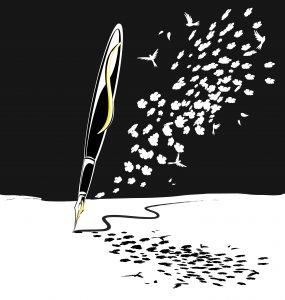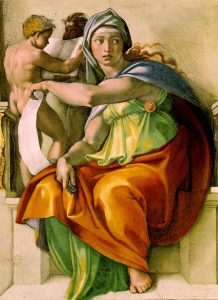We writers of fiction often play god creating both characters and plot and setting that created world in motion to see  what happens, to even control what happens. We actually get to look inside the heads of our characters and see what’s going on there, what motivates, what inspires, what frightens, what excites. In a lot of ways that’s the norm. That’s what the writing life is supposed to be like, that’s supposed to be our experience as we plot the story and shape our characters.
what happens, to even control what happens. We actually get to look inside the heads of our characters and see what’s going on there, what motivates, what inspires, what frightens, what excites. In a lot of ways that’s the norm. That’s what the writing life is supposed to be like, that’s supposed to be our experience as we plot the story and shape our characters.
But in every good writing experience I’ve ever had, in almost every novel I’ve ever written, there comes a point when I stop being the creator, when I stop telling the characters what’s going to happen and how they’ll react to it. There comes a point, a certain threshold – usually when I’m most deeply into the world I’ve created, when the characters rise up and rebel. They stop being my puppets and they start telling me exactly how it’s going to be. They make it very clear to me that I have been demoted from god, creator of the fictional world and all who live in it to … well … to a glorified secretary and little more. They tell me what to write and I don’t argue. I just write, because at that point, they know what’s best.
OK, the position is actually a bit more glamorous than that of a secretary because my characters now drag me along, whether my bag is packed or not, to wherever the plot takes them and through whatever twists and turns unfold in the process. I become the war correspondent reporting the action on the front. I become the Scribe, responsible for recording the facts, responsible for writing the truth as my characters see it. I also become their advocate. It becomes my job to speak for the character to the readers, to make sure the readers ‘get them’ and their plight.
The Scribe! I’ve been thinking a lot lately about what that means, especially as I work on the Medusa’s Consortium series in which the roll of the scribe becomes a lot more important. I’ve been trying out that position, opening myself to the idea of being prepared for anything. The result has been several stories I’ve shared with you on this blog, as well as some highly imaginative incidents that may or may not have involved strong drink, too little sleep, and a sense of humor that is most active when the imagination is stimulated. The story of the storyteller is another story within itself. The storyteller, the novelist, the war correspondent, the reporter, are all quite often used as plot devices that frame the story. In fact the story within a story, the plot within a plot, the play within a play is as old as Shakespeare and probably older. It’s old because it works. It works because it give more dimension and also allows the Scribe a little bit of
distance, a little bit of space to say, while pointing the finger, ‘Hey, it wasn’t my idea! They told me to say it! It’s their fault, not mine!’ If ever there was license for a writer to misbehave with abandon, I’d say the Scribe is it. So, I’m sure  you can see where I’m going with this. My Medusa novels, Blindsided as well as In The Flesh are both Scribe stories, in which our scribe, Susan Innes takes center stage. Encounter in a Dry Canyon and the encounters with Alonso Darlington as well as the lady in the sunglasses, (and you all now know that this lady will be putting me through my
you can see where I’m going with this. My Medusa novels, Blindsided as well as In The Flesh are both Scribe stories, in which our scribe, Susan Innes takes center stage. Encounter in a Dry Canyon and the encounters with Alonso Darlington as well as the lady in the sunglasses, (and you all now know that this lady will be putting me through my
paces for a long time to come) are all examples of the writer as Scribe, of the writer only there to observe and tell the characters’ stories.
Being a Scribe for the characters and events of an intriguing story means that I, the writer, gets the hell out of the way and let the characters tell the story, let them guide me through the events as they unfold. If I’m not in the way, the story is one step closer to its purest form, colored by the characters views of events and experiences rather than my own, and that has to be the difference between Nescafe and a freshly made, triple espresso with whipped cream on top!